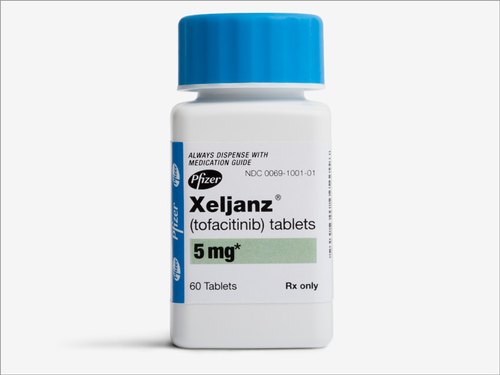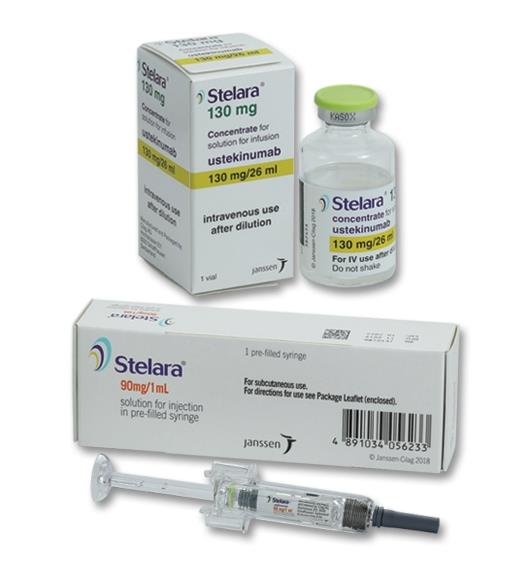Xeljanz (tofacitinib) vs Stelara (ustekinumab)
Xeljanz (tofacitinib) vs Stelara (ustekinumab)
Xeljanz (tofacitinib) is an oral Janus kinase inhibitor that works by blocking certain enzymes involved in the immune process, thereby reducing inflammation and is used to treat conditions like rheumatoid arthritis, psoriatic arthritis, and ulcerative colitis. Stelara (ustekinumab) is an injectable biologic that targets specific proteins, interleukin-12 and interleukin-23, to help control the immune response and is primarily used for the treatment of moderate to severe plaque psoriasis, psoriatic arthritis, and Crohn's disease. When deciding between Xeljanz and Stelara, considerations include the specific condition being treated, the preferred route of administration (oral vs. injection), and the patient's overall health profile, as both medications have different side effect profiles and mechanisms of action.
Difference between Xeljanz and Stelara
| Metric | Xeljanz (tofacitinib) | Stelara (ustekinumab) |
|---|---|---|
| Generic name | Tofacitinib | Ustekinumab |
| Indications | Rheumatoid arthritis, psoriatic arthritis, ulcerative colitis | Plaque psoriasis, psoriatic arthritis, Crohn's disease, ulcerative colitis |
| Mechanism of action | JAK inhibitor that interferes with the JAK-STAT signaling pathway | Monoclonal antibody that targets interleukin-12 and interleukin-23 |
| Brand names | Xeljanz, Xeljanz XR | Stelara |
| Administrative route | Oral | Subcutaneous injection, intravenous infusion |
| Side effects | Upper respiratory tract infections, headache, diarrhea, and hypertension | Nasopharyngitis, headache, fatigue, and injection site reactions |
| Contraindications | Severe hepatic impairment, active serious infections, tuberculosis | Active clinically significant infections, tuberculosis |
| Drug class | Janus kinase (JAK) inhibitor | Interleukin inhibitor |
| Manufacturer | Pfizer | Janssen Biotech |
Efficacy
Xeljanz (Tofacitinib) Efficacy in Psoriatic Arthritis
Xeljanz (tofacitinib) is an oral medication that belongs to a class of drugs known as Janus kinase (JAK) inhibitors. It is approved by the U.S. Food and Drug Administration (FDA) for the treatment of adults with active psoriatic arthritis (PsA) who have had an inadequate response or intolerance to methotrexate or other disease-modifying antirheumatic drugs (DMARDs). Clinical trials have demonstrated that tofacitinib can reduce the signs and symptoms of PsA, improve physical function, and inhibit the progression of joint damage. The efficacy of tofacitinib in PsA was shown in several pivotal trials, including the Phase 3 OPAL Broaden and OPAL Beyond studies, where it was found to be effective in both TNF inhibitor-naïve patients and those with an inadequate response to TNF inhibitors.
Stelara (Ustekinumab) Efficacy in Psoriatic Arthritis
Stelara (ustekinumab) is a biologic medication administered by subcutaneous injection and is approved for the treatment of active psoriatic arthritis in adults. It works by targeting interleukins 12 and 23, which are believed to play a role in inflammatory and immune responses. In clinical trials, ustekinumab has been shown to reduce the signs and symptoms of PsA, improve physical function, and inhibit the progression of joint damage. The efficacy of Stelara for the treatment of PsA was established in large, multicenter, randomized, placebo-controlled trials, including PSUMMIT 1 and PSUMMIT 2. These trials demonstrated significant improvements in joint symptoms and physical function in patients with active PsA compared to placebo.
Comparative Efficacy
When comparing the efficacy of Xeljanz to Stelara for the treatment of Psoriatic Arthritis, it is important to consider individual patient characteristics, prior treatment responses, and potential side effects. Both medications have been shown to be effective for PsA in clinical trials, but direct head-to-head comparisons are limited. Treatment decisions should be made on a case-by-case basis, taking into account the specific needs and medical history of the patient. It is also crucial to monitor patients for any adverse effects and to adjust treatment as necessary.
Conclusion
Both Xeljanz (tofacitinib) and Stelara (ustekinumab) have been proven to be effective treatments for Psoriatic Arthritis, offering options for patients who may not respond to traditional DMARDs or who require alternative therapies. As with any medication, the decision to use Xeljanz or Stelara should be made in consultation with a healthcare provider, considering the full clinical picture and the patient's treatment goals. Ongoing research and clinical experience continue to refine the understanding of how best to utilize these medications in the management of Psoriatic Arthritis.
Regulatory Agency Approvals
Xeljanz
-
European Medical Agency (EMA), European Union

-
Food and Drug Administration (FDA), USA

-
Health Canada

-
Therapeutic Goods Administration (TGA), Australia

Stelara
-
European Medical Agency (EMA), European Union

-
Food and Drug Administration (FDA), USA

Access Xeljanz or Stelara today
If Xeljanz or Stelara are not approved or available in your country (e.g. due to supply issues), you can access them via Everyone.org.
How it works

Make an enquiry
Choose the medicine you want to buy, answer a couple of questions, and upload your prescription to speed things up. We’ll get back to you within 24 hours.


Make an enquiry
Choose the medicine you want to buy, answer a couple of questions, and upload your prescription to speed things up. We’ll get back to you within 24 hours.


Breeze through the paperwork
We'll guide you through the required documents for importing unapproved medicine, ensuring you have all the necessary information.


Get a personalized quote
We’ll prepare a quote for you, including medicine costs and any shipping, administrative, or import fees that may apply.


Receive your medicine
Accept the quote and we’ll handle the rest - sourcing and safely delivering your medicine.

Some text on this page has been automatically generated. Speak to your physician before you start a new treatment or medication.
Let's talk
If you have any questions, call us or send us a message through WhatsApp or email:
Contact us




